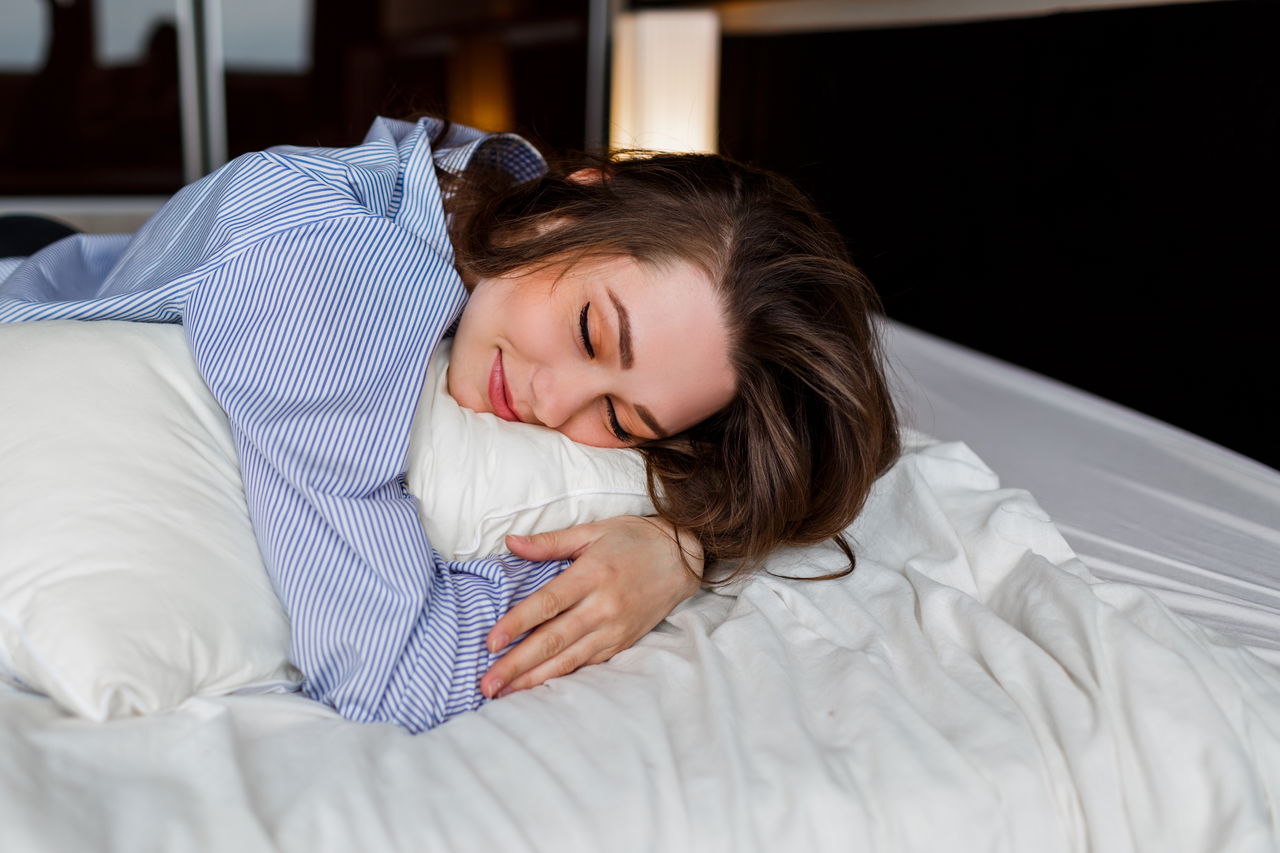Hibrid guide
Biohacking Sleep: How to Improve Quality and Efficiency
8 min. read


Written by
Alicia Madison
Published
Fri, 25 Oct 2024
Introduction
For optimal physical and mental performance, sleep quality is just as crucial as diet and exercise. Yet, in our fast-paced world, sleep is often the first thing sacrificed. Biohacking sleep offers a way to enhance both the quality and efficiency of your rest by making small, science-based adjustments to lifestyle, environment, and even supplements. Here, we’ll explore the most effective biohacks for better sleep, from creating the ideal sleep environment to using supplements that support relaxation and deeper rest.
The Science of Sleep and Why It Matters
Sleep isn’t just a passive activity; it’s a vital period during which our bodies repair, detoxify, and regenerate. Quality sleep supports memory, emotional regulation, immune function, and muscle recovery. The brain uses this time to process information and clear out toxins, which contributes to better mental clarity and focus during waking hours.
The key to biohacking sleep lies in aligning with your body’s natural rhythms—especially the circadian rhythm, which is your body’s internal clock. By making targeted adjustments to your sleep routine and environment, you can improve both the depth and efficiency of your sleep, helping you wake up refreshed and energized.
Biohacking Techniques for Better Sleep Quality
1. Optimize Light Exposure
Light is one of the most powerful cues for regulating circadian rhythms. Here’s how to use it to your advantage:
-
Morning Sunlight : Exposing yourself to natural sunlight within an hour of waking helps set your internal clock, making it easier to fall asleep at night. Try to spend 10-15 minutes outside each morning.
-
Limit Evening Light : Blue light from screens (phones, laptops) can interfere with melatonin production, a hormone critical for sleep. Use “night mode” on devices or consider blue light-blocking glasses if you need to work late.
2. Maintain a Consistent Sleep Schedule
Going to bed and waking up at the same time every day strengthens your circadian rhythm, leading to more restful sleep. Try to stick to this schedule, even on weekends. If you have trouble sticking to it, set a “wind-down” alarm an hour before bedtime as a reminder to start preparing for sleep.
3. Create a Sleep-Friendly Environment
Your bedroom environment plays a significant role in sleep quality. Here are some easy ways to optimize it:
-
Cool the Room : The ideal sleep temperature is between 60-67°F (15-19°C). A cooler room helps facilitate deeper sleep by lowering your body temperature, which is a natural cue for rest.
-
Use Blackout Curtains : Darkness signals your body to release melatonin, making blackout curtains a great investment for better sleep.
-
Minimize Noise : Use earplugs, a white noise machine, or soft music to drown out any disruptive sounds and create a calming environment.
4. Practice Pre-Sleep Relaxation Techniques
Winding down with relaxation techniques before bed can help ease the transition from wakefulness to sleep:
-
Meditation : Guided meditation or deep breathing exercises calm the nervous system, reducing stress hormones that may interfere with sleep.
-
Stretching or Yoga : Gentle stretching or bedtime yoga can relieve muscle tension and promote relaxation.
-
Journaling : Writing down any lingering thoughts or worries can clear your mind, making it easier to relax and fall asleep peacefully.
Supplements That Support Sleep Quality
Certain supplements can support your body’s natural sleep mechanisms. If you’re struggling with sleep quality, these supplements may help:
-
Melatonin : Melatonin is the hormone that signals your body to sleep. While it’s naturally produced in response to darkness, supplemental melatonin can help reset sleep cycles, especially if you’re adjusting to a new schedule or dealing with jet lag. Start with a low dose (0.5-1 mg) and increase only if needed.
-
Magnesium : Known for its calming effects, magnesium helps relax muscles and calm the nervous system. Magnesium glycinate or citrate are two common forms that aid sleep without causing digestive issues. Consider a dose of 200-400 mg an hour before bed.
-
L-Theanine : This amino acid, found in green tea, promotes relaxation without causing drowsiness. Taken before bed, L-theanine can help quiet the mind, especially if racing thoughts keep you awake. Look for doses between 100-200 mg.
-
GABA (Gamma-Aminobutyric Acid) : GABA is a neurotransmitter that inhibits nervous system activity, promoting calmness and relaxation. GABA supplements may reduce sleep latency (time it takes to fall asleep) and improve sleep quality.
-
Ashwagandha : As an adaptogen, ashwagandha helps the body manage stress and lower cortisol levels. High cortisol in the evening can disrupt sleep; ashwagandha can help bring cortisol down to a level that supports rest.
Lifestyle Tips for Efficient Sleep
-
Limit Caffeine Intake : Caffeine’s stimulating effects can last up to six hours, so avoid it in the late afternoon and evening. If you’re especially sensitive to caffeine, consider limiting it to the morning hours. Herbal teas like chamomile or peppermint are great evening alternatives.
-
Avoid Heavy Meals Before Bed : Eating a heavy meal too close to bedtime can make it harder to fall asleep as your body focuses on digestion. Try to finish dinner at least 2-3 hours before bed. If you need a snack, opt for something light, like a banana with almond butter or a handful of nuts.
-
Keep a Sleep Journal : If you’re biohacking your sleep, tracking your progress is essential. Use a sleep journal to record factors like your bedtime, wake time, quality of sleep, and any relevant notes about your diet, supplements, or activities that day. This data can help you identify what positively or negatively affects your sleep.
-
Exercise, but Not Too Late : Regular physical activity promotes better sleep quality. However, exercising too close to bedtime can leave you feeling energized, so aim to complete workouts at least 3-4 hours before bed. Morning or early afternoon exercise is ideal, as it supports circadian rhythms and energy levels throughout the day.
Measuring the Quality of Your Sleep
To know if your sleep hacks are working, it’s helpful to monitor your sleep quality. Here are some ways to do so:
-
Sleep Tracking Devices : Wearable devices, like the Oura Ring or Fitbit, measure sleep stages, duration, and restfulness. Tracking sleep data over time allows you to see patterns and assess the effectiveness of biohacks.
-
Subjective Sleep Quality : Every morning, rate how well-rested you feel on a scale of 1-10. Over time, you’ll notice improvements as your sleep quality increases.
-
Sleep Latency : If you fall asleep within 10-20 minutes, it’s a sign that your body is ready for rest. Longer sleep latency may indicate the need to adjust your routine or try new relaxation techniques.
Key Takeaways
Biohacking sleep focuses on optimizing your body’s natural rhythms and creating an environment that promotes restful, efficient sleep. From adjusting your light exposure and sleep environment to using targeted supplements, small changes can make a significant difference. By consistently implementing these strategies, you can achieve better sleep quality, enhance your physical and mental performance, and wake up feeling refreshed each day.
In Conclusion
Achieving high-quality sleep is fundamental for overall health and performance. With a few simple biohacks, such as creating a consistent sleep schedule, optimizing your bedroom environment, and incorporating supportive supplements, you can improve your sleep quality and efficiency. Remember that consistency is key, and by establishing a sleep-friendly routine, you’re setting the foundation for a healthier, more energized life.

Alicia M.
@alicia_96
Biohacking Sleep: How to Improve Quality and Efficiency
